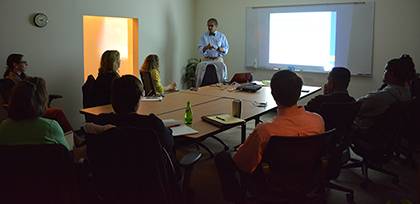Bring Diversity and Inclusion Training to Your Office
Duke’s Office for Institutional Equity offers professional development across campus

As important diversity conversations occur on campus, Duke Development and Alumni Association leaders contemplated ways to bring diversity and inclusion training to their 200 staff members.
Not only would diversity training help staff gain a deeper understanding of issues and perspectives of about 157,000 diverse Duke alumni, but the training could also encourage workplace conversations, said Lisa Worster, senior assistant vice president for Development Services.
Read More“The ability to have difficult conversations is something that actually will help in this challenging kind of space,” she said. “If we don’t talk about it and if we don’t acknowledge where we’re uncomfortable, then the conversations are not going to move forward.”
Worster, along with Scott Greenwood, chief operating officer for the Alumni Association, is currently planning with the Duke Office for Institutional Equity (OIE) to bring a diversity professional development series to their departments in 2017. Part of the Office for Institutional Equity’s charge is to meet with managers and teams in the university and health system to examine challenges regarding diversity, inclusion and respectful behaviors.
These professional development opportunities take the form of workshops, retreats and presentations about topics such as respectful workplace behaviors, generational differences, sex and gender diversity, and subtle bias, stereotypes and prejudice.
OIE is experiencing an increase in training requests, especially related to conversations about race and unconscious bias, or implicit positive or negative attitudes or associations toward a person that sways choices, decisions and behavior.
“We sit down with staff and listen to what their needs are, voids are, challenges are, opportunities are, and how we can move forward,” said Paul James, the office’s director of diversity, equity and inclusion. “We know what the promising practices are. We know the difference between when there’s a session needed on growth and development versus when egregious acts are occurring. We know the difference between trends versus what’s hot in the media.”
The Office for Institutional Equity has visited departments and offices ranging from Nicholas School of the Environment graduate students to School of Nursing faculty search committees. In-person professional development opportunities allow employees to dissect word choice and tone, body language and other behaviors that can impact respect, diversity and inclusion in the workplace, said Bob Crouch, the office’s assistant director of diversity, equity and inclusion.
“The biggest thing is dialogue and really getting folks to communicate with one another,” Crouch said. “We have to become more comfortable with the uncomfortable, because sometimes there’s a reluctance to be the first one to engage a colleague in that conversation, and we might be able to work in much more harmony with each other.”
The Duke Office for Institutional Equity’s professional development topics include:
- Creating an inclusive and respectful workplace
- Cross-cultural communication and intercultural awareness
- Leading and managing diverse teams
- Generational differences in the workplace
- Sex and gender diversity education
- Breaking the cycle of subtle bias, stereotypes, prejudice and discrimination
- Developing diversity leadership teams and committees
- Search committee strategies for identifying qualified, diverse talent pools and conducting an equitable process
Questions about professional development opportunities can be directed to Office for Institutional Equity staff.